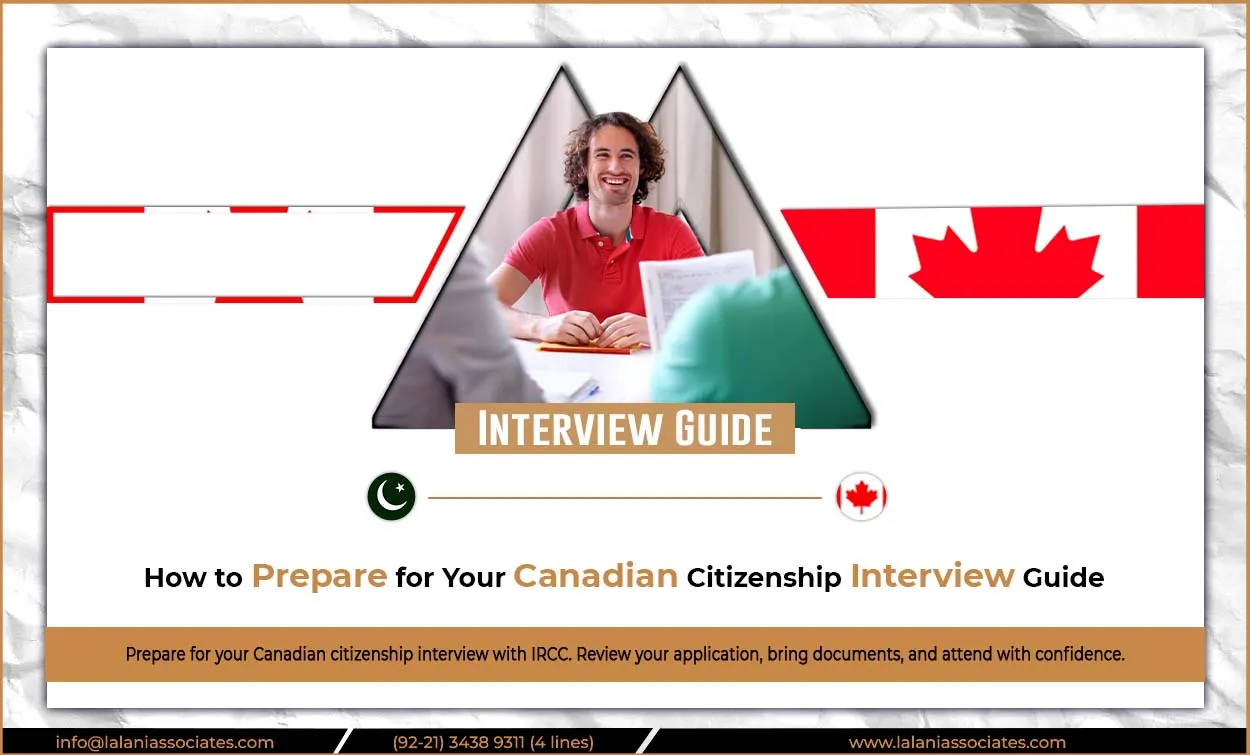
Getting Canadian citizenship is a huge step, and sometimes you may have to go to a citizenship interview with Immigration, Refugees, and Citizenship Canada (IRCC). A lot of people who apply for jobs find this phase of the process stressful, but if you get ready for it, you can go into the interview feeling calm and sure of yourself.
Understanding the Citizenship Interview
Getting Canadian citizenship is a huge step, and sometimes you may have to go to a citizenship interview with Immigration, Refugees, and Citizenship Canada (IRCC). A lot of people who apply for jobs find this phase of the process stressful, but if you get ready for it, you can go into the interview feeling calm and sure of yourself.
Why a Citizenship Interview is Conducted
Interviews are not standard for all applicants. IRCC may ask you to attend an interview if:
• They need to verify details in your application
• There are questions about your residence history or travel history
• They want to confirm your identity and documents
In short, the interview helps IRCC ensure all the information you provided is accurate.
What to Expect in a Citizenship Interview
The interview is usually held in person at a local IRCC office. An officer may ask questions about:
• Your residency in Canada
• Your travel outside Canada
• Your permanent residence (PR) history
• Your family background and identity documents
Think of it as a formal check, not a test.
How to Prepare for Your Canadian Citizenship Interview
Preparation is the key to success. Here are some important steps:
Step 1: Review Your Application Carefully
Read through your applications for citizenship and permanent residency line by line. You should remember what you typed since the officer might ask you questions based on what you said.
Step 2: Understand Your PR History
You can be asked about your PR timeline, tax returns, and proof that you live in Canada because citizenship is dependent on permanent residency.
Step 3: Be Truthful and Consistent
Always tell the truth. Be ready to clarify any faults you made in your application clearly.
Reviewing Your Application Thoroughly
Before the interview, read through all your submitted documents. Pay close attention to:
• Travel dates
• Residency days in Canada
• Employment history
• Family details
Supporting documents are proof that backs up what you say. Bringing these shows the IRCC that you are ready and serious.
Gathering Supporting Documents
Supporting documents are proof that backs up what you say. Bringing these shows the IRCC that you are ready and serious.
Common Supporting Documents for Canadian Citizenship Interview
• Residence History: Lease agreements, property papers, or utility bills
• Travel Records: Flight tickets, booking confirmations, hotel reservations
• PR Application Proof: Invitation to Apply (ITA), PR card, tax documents, letters from IRCC
• Citizenship Proof: Birth certificates, parents’ citizenship certificates
How to Answer Questions with Confidence
• Keep your cool and pay attention.
• Answer quickly, clearly, and honestly.
• It's better to say you don't remember anything than to guess.
Avoiding Misrepresentation
Giving inaccurate or misleading information is called misrepresentation. This is a serious crime under Canadian immigration law, and it can lead to:
• Your application for citizenship was denied.
• Losing your status as a permanent resident
• Not being able to apply again for years
So always stay transparent.
Hiring a Representative for Your Citizenship Interview
You can hire either an immigration lawyer or a regulated consultant. They are able to:
• Talk about how the interview works
• Help you get ready for possible enquiries
• Check your application for mistakes
But keep in mind that they won't be able to answer your queries during the interview.
Practice Before the Interview
A great way to prepare is to practice with mock interviews. You can do this with:
• A relative or friend
• You can find sample questions online.
This will make you feel more sure of yourself and less nervous.
Day of the Citizenship Interview
On the day of the interview, remember to:
• Wear professional clothes
• Get there early to avoid tension.
• After the Interview for Citizenship
After the Citizenship Interview
Once your interview is done, IRCC may:
• Give your application the green light
• Ask for more information
• Take more time to review
Most people who apply get an update within a few weeks.
Tips for Success
• Get ready as soon as you find out about the interview.
• Put all of your records in one place.
• Stay cheerful and sure of yourself; this is your time to show that you are ready to be a Canadian citizen.
Conclusion
The Canadian citizenship interview could sound daunting, but if you prepare for it, are honest, and have the right attitude, it will just be another step toward becoming a proud Canadian citizen. You may show the IRCC that you are ready for this exciting step by going over your application, getting all your paperwork in order, and staying calm during the interview.
FAQs
1. What happens if I fail my Canadian citizenship interview?
If you don't answer questions or give them the necessary documentation, IRCC may put off or turn down your application. But most of the time, they let you show them further proof.
2. How long is the interview process?
Most interviews go between 30 minutes and an hour, although this can change based on your scenario.
3. Can I bring someone with me to the interview?
You can't bring friends or family inside, but you can pay someone who is allowed to be there to support you outside of the questioning.
4. Do all applicants need an interview?
No, only applicants whose applications need more proof or information are asked to come in for an interview.
5. How soon after the interview will I get a decision?
You'll usually hear back from us in a few weeks, but some cases that are more involved may take longer.


0 Comments